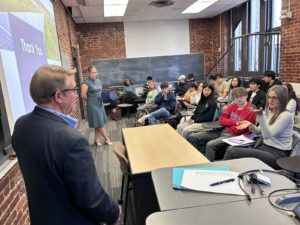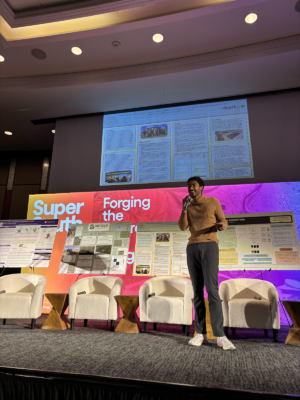The student becomes the teacher: one undergraduate’s journey in environmental protection

Growing up, Devan Wiley spent a lot of time in nature.
As part of an active family that encouraged outdoor adventures, Wiley developed a love for the natural world. But it wasn’t until college, when Wiley began to realize the full extent of the climate crisis, that they found themself drawn toward environmental protection.
While at Vanderbilt, Wiley, BA’25, double majored in economics and public policy studies with the intention of working in sustainability. Economics equipped Wiley with the technical skills for the profession, but they found public policy studies best encompassed the work they hoped to do both at Vanderbilt and beyond.
“It’s difficult to chart my entire course of how I reached this point in my studies,” Wiley said. “There are so many aspects of my identity, upbringing, and values that led me to be interested in environmental and climate justice.”
During their final semester, Wiley had the opportunity to apply their passion for environmental justice by serving as the teaching assistant for SOC3316: Business, Civil Society, and the Environment.
In the class, taught by Associate Professor of the Practice of Climate Studies Zdravka Tzankova, Wiley led a group of 21 undergraduate students through a collaborative project with local solar energy company Clearloop. Clearloop creates carbon solutions for organizations of all sizes to decarbonize the economy, expand access to clean energy, and accelerate the development of new solar projects in American communities.
The students investigated the drivers of rural community support and opposition to large-scale solar initiatives, focusing on regions and communities where Clearloop’s solar projects are sited or being planned. Students were divided into four teams, with two teams conducting research in Brownsville, Tennessee, and two teams conducting research in Panola County, Mississippi.
Starting with a broader review and synthesis of available academic and practitioner knowledge on solar perceptions in U.S. rural communities, student teams focused the bulk of their research on collecting and analyzing data through media analysis and interviews. The interviews, a key component to the project, consisted of semi-structured conversations with a group of community members.
The interviews generated important insights for Clearloop and highlighted the opportunities and obstacles Clearloop faces. They also helped strengthen Clearloop’s community relations so the company can not only better serve the communities in which their projects reside but also open the door to new partnerships. The interviews also provided students an opportunity to engage in experiential learning with benefits that will extend beyond the classroom.
“I hope this project serves as a gateway to further discussion on the effects of mistrust and miscommunication between solar developers and rural communities within the southeastern United States,” Wiley said. “The southeastern United States experiences disproportionately high energy cost burdens and household electricity rates. Centering conversations about energy equity around marginalized communities is a great way to assess historic patterns of underrepresentation.”
The partnership between Clearloop and the class started in Spring 2024 based on Tzankova’s long-standing relationship with the company. In discussing Clearloop’s interest in sharpening their understanding of solar perceptions in rural communities within their area of operation, Tzankova, Clearloop Co-founder and Chief Operating Officer Bob Corney, and Clearloop Senior Community Partnerships Associate Karina Rovey, BS’22, established the collaboration—one that offers students the opportunity to learn from solar industry leaders while engaging in research and that gives Clearloop research insights.

“These types of projects enable the Vanderbilt community—students and faculty included—to develop meaningful and lasting partnerships with businesses, community members, nonprofits, and government partners in Nashville, in Tennessee, in the southeast region, and beyond,” Tzankova said. “Students are eager to do actionable research, both for the contributions it makes to socio-ecological problem solving and for the hands-on learning opportunities it presents. These types of partnerships put the Vanderbilt community in an excellent position to play a critical part in positive social change.”
In April, Wiley presented the project at the Super South Summit in Georgia, winning third place in the summit’s Capstone Challenge.
Having graduated in May, Wiley plans to remain at Vanderbilt for the summer as a research assistant in the Private Climate Governance Lab while also helping Tzankova choose a new teaching assistant to take over the class next spring. In the fall, Wiley will start a job at Ernst & Young in Ohio as a sustainability tax and incentives consultant.
“Being able to be face-to-face with my fellow students in SOC3316 was always a pleasure,” Wiley said. “These were my friends, peers, and underclassmen, and I felt really at home learning and growing with them all. I really love teaching, and I do want to pursue further education in the near future—I think I’ll come full circle and return to my roots of environmental justice.”
